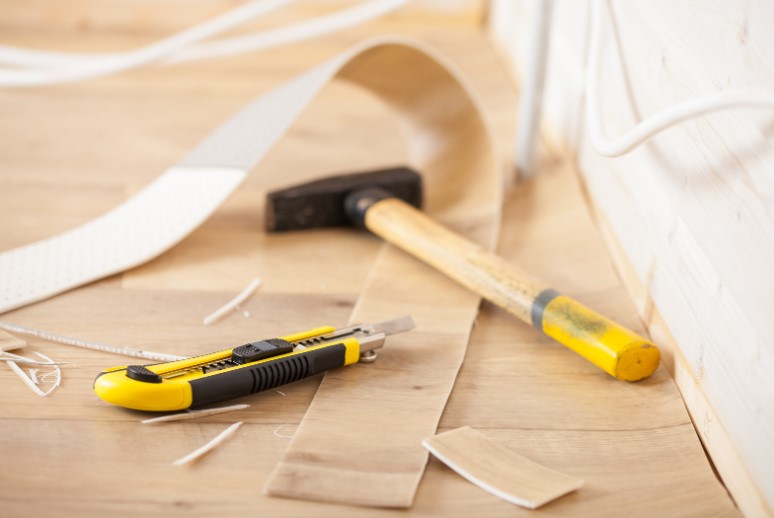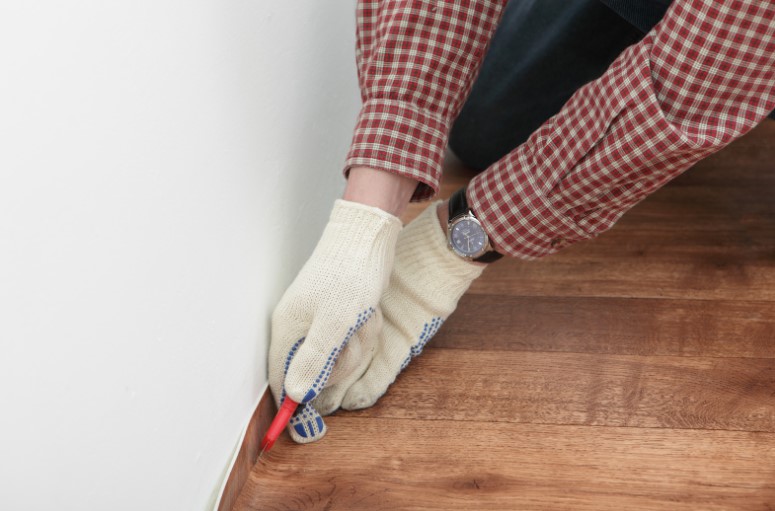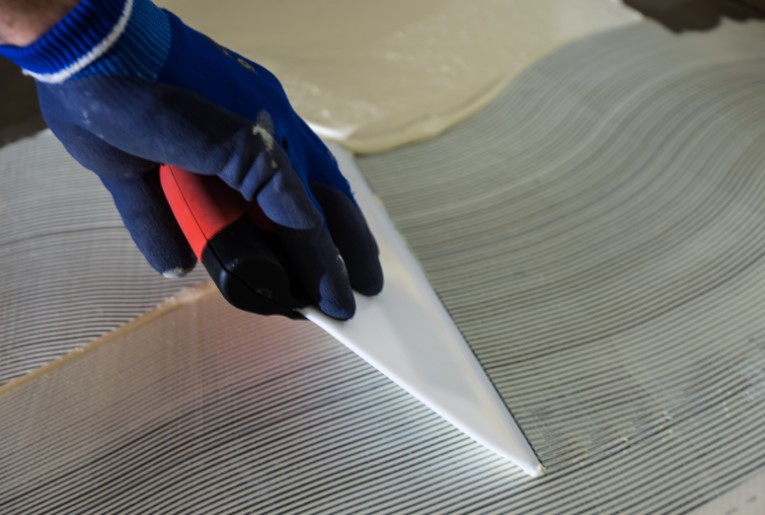Linoleum flooring is a fantastic option for bathrooms due to its durability, water resistance, and ease of maintenance. If you’re considering a DIY project to install linoleum flooring, this guide on how to lay linoleum flooring in a bathroom will help you more.
What Tools and Materials Do You Need?
-
Tools:
- Utility knife
- Measuring tape
- Straight edge or ruler
- Trowel
- Roller
- Notched spreader
-
Materials:
- Linoleum sheets
- Adhesive
- Floor primer (if needed)
- Seam sealer
- Cleaning supplies
How to Prepare Your Bathroom Floor?
Clearing and Cleaning the Bathroom
First, remove all items from the bathroom, including furniture, rugs, and any detachable fixtures. Thoroughly clean the floor to ensure there is no dirt, dust, or debris.
Assessing the Subfloor Condition
Inspect the subfloor for any damage. It needs to be smooth, dry, and level. Any imperfections could affect the installation and the longevity of the linoleum.
Making Necessary Repairs
Fill any cracks or holes with a suitable filler and sand the subfloor to create a smooth surface. If the subfloor is uneven, you might need to use a self-leveling compound.
How to Measure and Cut Linoleum?
Measuring the Bathroom Floor Accurately
Measure the length and width of your bathroom at several points to get the most accurate dimensions. Remember to measure the spaces around fixtures like the toilet and sink.
Marking and Cutting the Linoleum
Transfer your measurements to the linoleum sheet. Use a straight edge and a utility knife to make precise cuts. Cutting linoleum can be tricky, so take your time to avoid mistakes.
Tips for Precise Cutting
Ensure you leave a small allowance for trimming once the linoleum is laid out. This will help you to achieve a perfect fit.
How to Apply Adhesive and Lay Linoleum?
Choosing the Right Adhesive
Select an adhesive that is recommended for linoleum and suitable for bathroom conditions. Some adhesives are water-resistant, which is ideal for bathrooms.
| Adhesive Type | Features | Recommended For |
| Acrylic Adhesive | Fast-drying, strong bond | General linoleum flooring |
| Latex Adhesive | Flexible, water-resistant | Bathrooms, kitchens |
| Pressure-Sensitive | Easy to reposition | DIY projects |
Spreading the Adhesive Evenly
Follow the manufacturer’s instructions for spreading the adhesive. Use a notched spreader to apply it evenly over the subfloor.
Positioning and Laying the Linoleum
Carefully position the linoleum over the adhesive, starting from one end and working your way to the other. Press down firmly as you go to avoid air bubbles.
How to Smooth and Secure the Linoleum?
Rolling Out Air Bubbles
Use a roller to smooth out any air bubbles, working from the center outwards. This will ensure a strong bond between the linoleum and the subfloor.
Trimming Excess Linoleum
Trim any excess linoleum around the edges using a utility knife. Be conscious to avoid gaps or overlaps.
Securing Edges and Seams
Apply seam sealer to any joins between linoleum sheets to prevent water from seeping underneath.
How to Handle Linoleum Around Fixtures?
Cutting Linoleum Around Toilets and Sinks
Make precise cuts around fixtures by creating templates with paper or cardboard first. Lay the template over the linoleum to mark the cut lines.
Sealing Edges to Prevent Water Damage
Use waterproof sealant around the edges of the linoleum, especially near bathtubs, toilets, and sinks. This helps in protecting subfloor from water damage.
How to Maintain Your Linoleum Flooring?
Regular Cleaning Tips
Sweep and mop your linoleum floor regularly to keep it clean. Use a damp mop and mild detergent; avoid harsh chemicals.
Preventive Measures to Prolong Lifespan
Place mats at the bathroom entrance to reduce dirt and grit. Use felt pads under heavy furniture to prevent indentations.
Addressing Common Issues
If you notice any lifting or curling edges, reapply adhesive and use a heavy object to hold the linoleum in place until the adhesive sets.
How Much Does It Cost to Install Linoleum Flooring?
The cost of installing linoleum flooring can vary based on several factors, including the size of the bathroom, the quality of the linoleum, and whether you hire a professional or do it yourself.
| Item | Cost Range (UK) |
| Linoleum Flooring | £15 – £45 per square meter |
| Adhesive | £5 – £20 per tub |
| Additional Tools | £10 – £50 |
| Professional Labor | £20 – £40 per hour |
DIY vs. Professional Installation
- DIY Installation: If you choose to do it yourself, you will save on labor costs but will need to invest in tools and materials.
- Professional Installation: Hiring a professional ensures a high-quality finish and can be faster, but it will be more expensive.
Conclusion
Installing linoleum flooring in your bathroom is a manageable DIY project that can greatly enhance the space. By following these steps on how to lay linoleum flooring in a bathroom, you can get an awesome-looking result for your Bathroom.





0 Comments